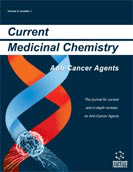Abstract
Epothilones are naturally occurring 16-membered macrolides with the ability to promote tubulin polymerization in vitro and to stabilize preformed microtubules against Ca2 or cold-induced depolymerization. At the cellular level, interference with microtubule functionality results in potent inhibition of cancer cell proliferation at nM to even sub-nM concentrations. Most significantly, epothilones, unlike paclitaxel (Taxol), are equally active against drug-sensitive and multidrug-resistant cell lines in vitro and epothilone B has also shown potent in vivo antitumor activity in Taxol-resistant human tumor models. Epothilone B is currently undergoing Novartis-sponsored Phase II clinical trials. In addition to naturally occurring epothilones, numerous synthetic and semi-synthetic analogs have been prepared since the absolute stereochemistry of epothilone B was first disclosed in mid-1996 and their in vitro biological activity has been determined. These studies have generated a wealth of SAR data in a rema rkably short period of time, given the complexity of the synthetic targets pursued. One of these analogs, BMS-247550, is presently in Phase II clinical trials by Bristol-Myers Squibb. In a first part this review is intended to provide a summary of the basic features of the in vitro biological profile of epothilones A and B, including emerging data on potential cellular epothilone resistance mechanisms. The second and third part will feature a comprehensive discussion of the epothilone SAR as it has emerged from the work of various (industrial and academic) laboratories across the world, including our own, with regard to effects on tubulin polymerization, in vitro antiproliferative activity, and in vivo antitumor activity.
Keywords: Epothilones, tubulin polymerization, antiproliferative activity, antitumor activity, Paclitaxel
 21
21

















